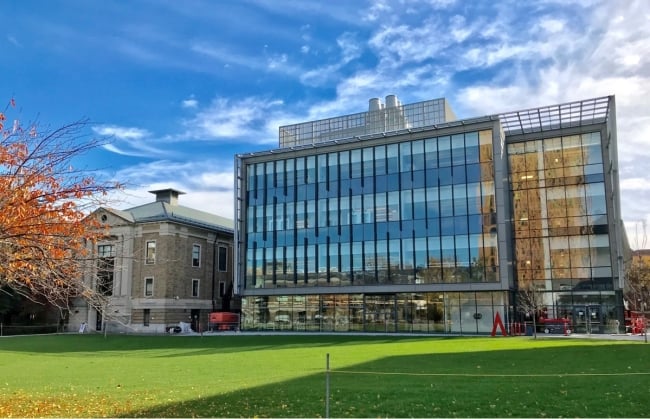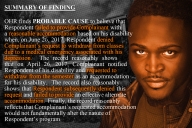You have /5 articles left.
Sign up for a free account or log in.

Courtesy of Wentworth Institute of Technology
Worried for their safety and stretched thin between work and parenting responsibilities, faculty members and librarians at Wentworth Institute of Technology in Boston voted no confidence in the institution's president and administration Monday.
Faculty members and librarians are worried about COVID-19 exposure on campus as the pandemic continues to worsen across the United States. The university reopened campus this fall with a hybrid in-person and online instruction model. A quarter of classes were offered in person and the remainder were taught online, according to a statement from the university. Faculty members teaching in person spent an average of four to six hours per week on campus.
That will change next spring, when the university will require more in-person instruction, said Greg Sirokman, a chemistry professor and president of the Wentworth Faculty Federation, the union representing faculty members and librarians. Exactly how much more is unclear. At first, faculty members were asked to teach one of their three courses in person next spring, and later they heard that 50 percent of the teaching load will be in person, Sirokman said. The in-person targets for spring instruction have not been publicized to faculty members yet, but Sirokman feels certain they will be an increase from the fall.
Wentworth faculty members join others at many universities who are upset with their institutions' COVID-19 response plans. Standoffs between faculty unions and college administrations have cropped up throughout the pandemic. Faculty unions at the University of Central Florida, the University of Florida and Florida Atlantic University filed grievances against their institutions for pushing in-person instruction. At Northeastern University, faculty members went back and forth with the administration about in-person teaching plans and accommodations for this spring, and University of Michigan faculty members put pressure on the university to include more remote teaching for the winter term.
The situation at Wentworth shows how small private institutions and those focused on science and technology aren't immune to the tensions. Wentworth has counted 39 student COVID-19 cases this fall. Another seven employees and four contractors have tested positive for the virus. COVID-19 case numbers in Massachusetts are rising -- the state averaged 2,598 new cases per day last week, a 49 percent increase from the average two weeks earlier, according to The New York Times. Suffolk County, where Wentworth is located, averages 288 new cases per day.
The test positivity rate at Wentworth remains low -- 0.29 percent of more than 4,000 tests were positive in the last seven days. Massachusetts’ weekly positivity rate is 3.1 percent, and Boston’s two-week positivity rate is 1.69 percent, according to data provided by the university.
Employees who are uncomfortable working on campus can talk to their supervisors, Dennis Nealon, an university spokesperson, wrote in an email. The institution will make reasonable accommodations for any employee under the criteria of the Americans With Disabilities Act, he said.
Sirokman said faculty members have tried to seek accommodations for more remote work, but so far he hadn’t heard of a single COVID-19-related request that had been approved.
“The institute has a reopening guide that delineates that they would allow managers to make accommodations, but systematically those managers have refused to make those accommodations,” he said. He acknowledged that accommodations have been made in line with the Americans With Disabilities Act, but not outside the scope of that law.
The pandemic’s toll on working parents is well documented. Wentworth employees are no exception. The university did not detail additional accommodations for parents beyond individual arrangements with an employee’s supervisor.
A Wentworth faculty member, who wished to remain anonymous for fear of potential repercussions, discussed the challenges of working full-time and parenting during the pandemic. Remote work has helped her balance both worlds, she said in a press release from the faculty union, but more in-person teaching might not be possible for the mother of a young child.
“The stress takes its toll mentally and physically,” the faculty member said in the press release. “Because young children do require constant supervision and have frequent needs in terms of schooling and everyday function it has significantly impacted my ability to focus. Between balancing children and fitting in work there is no downtime anymore, no time to relax and ‘turn off.’ Teaching has been my number one focus, and I’ve prioritized it above all other commitments, such as research or service.”
During the fall semester, her colleagues covered in-person labs in her absence. But if the institute requires more in-person teaching time, “there is no guarantee that we can make it work,” she said.
In response to the anonymous faculty member’s concerns, Nealon said she was able to continue working remotely after consulting with her faculty leader, and that the university encourages others to make similar requests.
The Women’s Faculty Caucus at Wentworth, which advocates for themselves and other women employees at the university, has worked alongside the union to push for more flexible work policies. The caucus wrote a letter to Wentworth president Mark Thompson and Wentworth administrators asking for more remote work options. The letter was dismissed as a “working conditions issue” that should be dealt with through the faculty union, Sirokman said.
So far, the Wentworth administration has largely dismissed the faculty’s concerns during impact bargaining sessions, Sirokman said.
“We’ve brought this issue up repeatedly,” he said. “We’ve asked them to consider allowing people who have these constraints on their lives for them to have remote work options.”
The university's leadership does not agree with the faculty union’s characterizations of the institution’s COVID-19 response.
“The facts overwhelmingly bear out that the university has been able to protect the community while offering a quality learning experience. This has been possible through the adoption of a highly successful re-entry plan,” said a statement provided by the institute. “Our plan meets or exceeds health and safety protocols of federal, state and local agencies, including the Centers for Disease Control and Prevention, Massachusetts Department of Public Health and the Boston Public Health Commission. In fact, we are among only 6 percent of colleges and universities nationwide testing twice weekly.”
Moving forward, Sirokman said the union will continue to take further actions, including talking with the city of Boston. In the meantime, he still hopes the university and the union will be able to find a solution.
“I would like the institute to come to the table and negotiate in good faith to make sure their workforce is safe,” he said.








